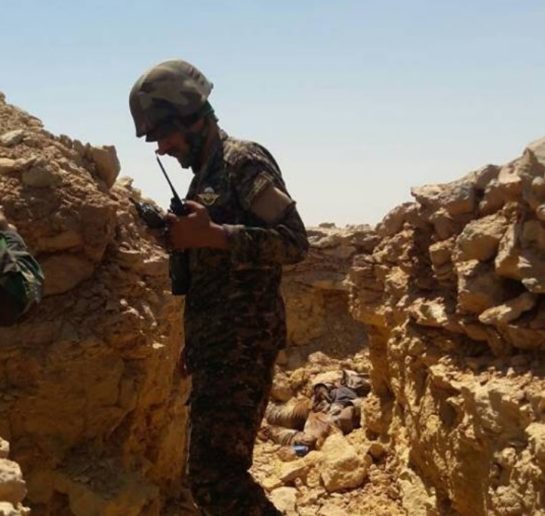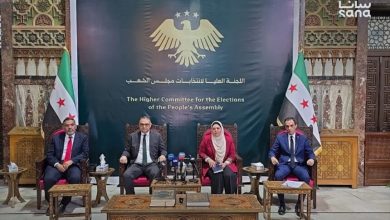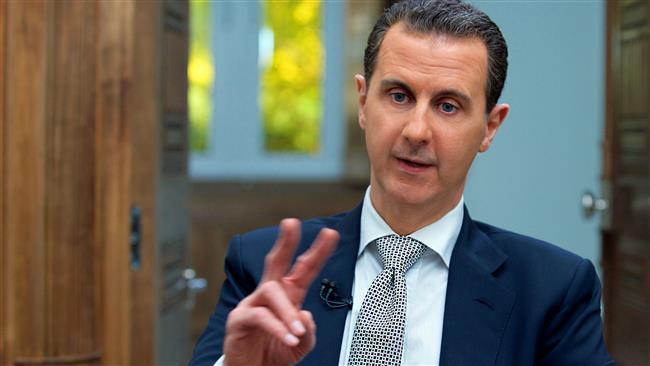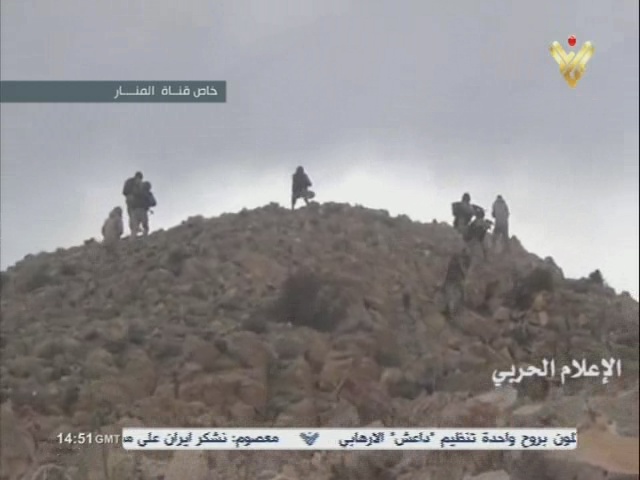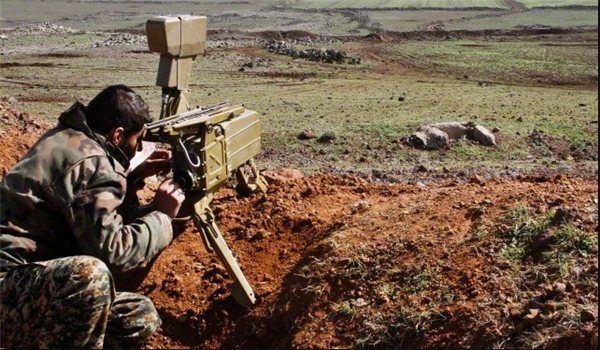President Al-Assad: Opposition should Not Be Puppet of Qatar ,KSA , US

In a Foreign Affairs’ interview published on Monday, the Syrian President Bashar Assad in Damascus talked about the Syrian Conflict.
As the Syrian conflict enters its fifth year, questions were posed concerning an end to the war. On the issue of Syria suffering heavy casualties over the past four years, President Assad refused a military end to the war in Syria advocating a political solution.
He commented on the matter, “All wars anywhere in the world have ended with a political solution, because war itself is not the solution; war is one of the instruments of politics. So you end with a political solution. That’s how we see it. That is the headline”.
When asked about the possibility to unite the increasingly dividing Syria – the three mini-states: a state controlled by the government, one controlled by “ISIL” and Jabhat al-Nusra, and one controlled by the more secular Sunni and Kurdish opposition, President Assad said that “the main issue is about the population. The population still supports the state regardless of whether they support it politically or not; I mean they support the state as the representative of the unity of Syria”.
He explained that the Syrians are still with the unity of Syria and that factions referred to control some Syrian areas are not stable and they tend to move around eliminating any clear lines of separation between different forces. President Assad added that “as long as you have the Syrian people believing in unity, any government and any official can unify Syria”.
Concerning the negotiated solution to the conflict that lead to a political transition in the light of the shift in the Western attitude where diplomats were looking for an interim settlement that would allow President Assad to keep a role rather than stepping down, President Assad commented that they were open to negotiations from the beginning and that they “have engaged in dialogue with every party in Syria”.
He carried on that what he means by “party” is not only the “political party”; and the change in Syria was between the different Syrian parties and entities and not between the government and the opposition. He stated, “At the end you should go back to the people through a referendum, because you’re talking about the constitution, changing the political system, whatever. You have to go back to the Syrian people”. The Syrian people should make the decision.
President Assad approved of attending the negotiations but he commented on the nature of the negotiating party. He said “the opposition in general has to have representatives in the local administration, in the parliament, in institutions; they have to have grass roots to represent on their behalf”. But according to the fighters, they are not represented by the opposition. So the fruitful dialogue is going to be between the government and those fighters.
Assad added “Opposition means national; it means working for the interests of the Syrian people. It could not be an opposition if it was a puppet of Qatar or Saudi Arabia or any Western country, including the United States, paid from the outside. It should be Syrian. We have a national opposition. I’m not excluding it; I’m not saying every opposition is not legitimate. But you have to separate the national and the puppets. Not every dialogue is fruitful”.
President Assad assured that they would meet with everyone without any conditions on the basis that they represent a certain party.
According to President Assad, a cease-fire and a freeze in Aleppo was implemented even before UN representative Staffan de Mistura was assigned the mission. He said that this measure was also implemented in Homs and other suburbs, villages, and so on, and it succeeded. He added that De Mistura came to Syria with headlinesthey approved on and are discussing “a detailed plan or schedule-A-to-Z plan” with De Mistura’s deputy.
Concerning the Moscow talks, President Assad explained that they were mere preparations for the talks. He asserted the idea that some of the groups were”puppets” of other countries.He also mentioned that it was in France’s interest that the conference did not succeed.
However, President Assad mentioned that what the Americans do is talk about things – the Moscow talks for example, but what they need to do is to act. He added, “And you know there’s mistrust between the Syrians and the US So just wait till we see what will happen at the conference”.
President Assad stated that the best way to strike a deal with the different parties in Syria is to directly deal with the fighters. There is nothing called the “moderate opposition” as Obama called them, they are rebels. Most of them joined al Qaeda, and some of them rejoined the army recently. They wereformer defectors who came back.
According to President Assad, negotiation with al-Qaeda was fruitless; “They are not ready to negotiate; they have their own plan,” he stated. He added that the Security Council resolution, no. 2170, on al-Nusra and ISIS, should be implemented and this resolution is very clear about preventing anyone from supporting these factions militarily, financially, or logistically – as what Turkey, Saudi Arabia, and Qatar are still doing.
Hence, if not implemented, no real solution can be discussed because there will be obstacles as long as they spend money. He also added on the issue, “Western countries should remove the umbrella still referred to by some as ‘supporting the moderate opposition’”.
Once again President Assad emphasized on mechanisms saying “it’s not a personal relationship; it’s about mechanisms”. He added “you don’t have to trust someone to do something. If you have a clear mechanism, you can reach a result”. It all comes down to the nature of the party of negotiation and the influence it has on the ground.
Fighters, according to Assad, were offered amnesty in many instances. He said, “People gave up their armaments; we gave them amnesty; they live normal lives”. On the other hand, there is no relation between opposition and the prisoners? So it is completely a different issue.
If the entire opposition lay down their weapons, they would be safe. But there were no guarantees. It’s a fifty-fifty success. Negative aspects should be expected, but they were not the major aspects.
On the light of Iran’s influence over Syria, various factors were involved. As a fact, “Iran is an important country in this region, and it was influential before the crisis,” said President Assad. He continued “in the Middle East, in our region, you have the same society, the same ideology, many similar things, the same tribes, going across borders. So if you have influence on one factor, your influence will be crossing the border. This is part of our nature. It’s not related to the conflict”.
President Assad declared, “Iran doesn’t have any ambitions in Syria, and as a country, as Syria, we would never allow any country to influence our sovereignty. We wouldn’t accept it, and the Iranians don’t want it either. We allow cooperation. But if you allowed any country to have influence, why not allow the Americans to have influence in Syria? That’s the problem with the Americans and with the West: they want to have influence without cooperation”.
President Assad refused that Iran is playing a greater role and deciding on its own after a commander of the Iranian Revolutionary Guard Corps, Hajizadeh, said in an interview in Der Spiegel that Iran’s supreme leader has ordered his forces to build and operate missile plants in Syria. Mr. Assad commented that the issue was “in full cooperation with the Syrian government, and that’s always the case”.
On the issue of Hizbullah forces on Syrian soil, President Assad stated, “it’s natural to say that only the institutions of the government, of the state, let’s say, are the guarantee for stability and to put things in order. Any other factor that would play a role in parallel with the government could be positive, could be good in certain circumstances, but it will always have side effects, negative side effects. That is a natural thing. And having militias who support the government is a side effect of the war. You have it, but you’re going to try to control this side effect”.
He continued, “Nobody will feel more comfortable than if they are dealing with government institutions, including the army and the police and so on. But talking about what happened in Quneitra is something completely different. Never has an operation against Israel happened through the Golan Heights since the cease-fire in 1974. It has never happened. So for “Israel” to allege that there was a plan for an operation-that’s a far cry from reality, just an excuse, because they wanted to assassinate somebody from Hizbullah”.
Assad confirmed, “That’s self-evident: the state cannot fulfill its commitment to society if it’s not the only master of order”.So in order to have effective sovereignty, the government has to have what is called a “monopoly of force”.
The situation in Iraq was different from the situation in Syria, Assad stated, “it’s because Paul Bremer didn’t create a constitution for the state; he created one for factions”. Whereas in Syria, he added, there was “a real constitution, a real, secular constitution… In Iraq, it is sectarian. When you talk about a sectarian constitution, it’s not a constitution”.
President Assad refuted the fact that the “Israelis” since the war began did not get involved except when they felt their interests were directly threatened. He asserted that they have been attacking Syria for nearly two years, without any reason. They attacked army positions and that the army being accidentally shelled is false allegations.
Concerning “Israel’s” Agenda in Syria, President Assad stated, “They are supporting the rebels in Syria. It’s very clear. Because whenever we make advances in some place, they make an attack in order to undermine the army. It’s very clear. That’s why some in Syria joke: ‘How can you say that al Qaeda doesn’t have an air force? They have the Israeli air force’”.
Economic-wise, President Assad indicated that there was no impact what so ever of the U.S.-Iranian nuclear deal norfalling oil prices on the war in Syria even if the closest allies and supporters, Iran and Russia, are very dependent on oil prices and they have suffered tremendous damage to their budgets in recent months as the price of oil had fallen.
He said on the matter, “They don’t give us money, so it has no effect on Syria. Even if they are going to help us, it would be in the form of loans. We’re like any other country: we have loans. Sometimes we pay; sometimes we take loans”.
President Assad explained what he meant by the mistakeshis government made in the course ofthe war which he had mentioned in previous interviews. According to him, “We took three main decisions: First of all, to be open to all dialogue. Second, we changed the constitution and the law according to what many in the opposition were saying, allegedly, that this is the reason of the crisis. Third, we took the decision to defend our country, to defend ourself, to fight terrorists. So I don’t think those three decisions can be described as wrong or mistakes”.
He added, “If you want to talk about practice, any official in any place can make mistakes, but there’s a difference between practice mistakes and policy mistakes”. So regarding the threemain decisions, he said “they were correct, and I am confident about this”.
Assad mentioned the potential for increased cooperation with the United States saying that “this potential needs will”.He added, “The question that we have is, how much will does the United States have to really fight terrorism on the ground? So far, we haven’t seen anything concrete in spite of the attacks on ISIS in northern Syria. There’s nothing concrete”.
He continued, “It’s not about greater involvement by the military, because it’s not only about the military; it’s about politics. It’s about how much the United States wants to influence the Turks. Because if the terrorists can withstand the air strikes for this period, it means that the Turks keep sending them armaments and money”.
Assad stated, “If you want to talk about the military involvement, American officials publicly acknowledge that without troops on the ground, they cannot achieve anything concrete”. But the troops should Syrians and not Americans, he said.
What the US should do was to pressure Turkey, Saudi Arabia, and Qatar to stop supporting the rebels, said President Assad. “The other thing is, to make legal cooperation with Syria and start by asking permission from our government to make such attacks. They didn’t, so it’s illegal” said President Assad on the basis of the actions that should be done by the U.S.In other words, the US should ask the Syrians for permission to take any actions concerning Syria and its affairs.
The head of the Syrian state had an optimistic view concerning the war in Syria, he said, “What we won in this war is that the Syrian people have rejected the terrorists; the Syrian people support their government more; the Syrian people support their army more. Before talking about winning territory, talk about winning the hearts and minds and the support of the Syrian people. That’s what we have won. What’s left is logistical; it’s technical. That is a matter of time. The war is moving in a positive way. But that doesn’t mean you’re not losing on the national level. Because you lose lives, you lose infrastructure; the war itself has very bad social effects”.
As a final point, when asked about his message to President Obama, President Assad’s answer was simple, “work for the interests of his people”. He added, “You are the greatest power in the world now; you have too many things to disseminate around the world: knowledge, innovation, IT, with its positive repercussions”. He emphasized the ability of America,as a great nation, to create problems without the ability to solve them.
President Assad concluded the interview with expectations of better policy that preserved stability in the Middle East declaring “If the Middle East is sick, the whole world will be unstable”.
He added, “The policy should be to help peace in the region, to fight terrorism, to promote secularism, to support this area economically, to help upgrade the mind and society, like you did in your country. That is the supposed mission of the United States, not to launch wars”.
Source: Foreign Affairs
